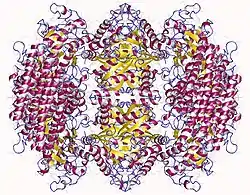Formiminotransferase-Cyclodesaminase
Formiminotransferase-Cyclodesaminase (FTCD) ist ein bifunktionales Enzym, welches die Konversion von Formiminoglutamat und Tetrahydrofolat in Formiminotetrahydrofolat und Glutamat katalysiert.
| Formiminotransferase-Cyclodesaminase | ||
|---|---|---|
 | ||
| Formiminotransferase-Cyclodesaminase homooktamer, Rattus norvegicus | ||
| Andere Namen |
LCHC1 | |
| Eigenschaften des menschlichen Proteins | ||
| Masse/Länge Primärstruktur | 58.927 Da / 541 AS[1] | |
| Kofaktor | Pyridoxalphosphat | |
| Bezeichner | ||
| Gen-Name | FTCD | |
| Externe IDs | ||
| Enzymklassifikation | ||
| EC, Kategorie | 4.3.1.4, Lyase | |
Bedeutung als diagnostischer Marker
Ein alternativer Name des FTCD ist Leber-Cytosol-Antigen (LC-1)[2]. Das Vorhandensein von Antikörpern gegen LC-1 (Anti-LC1) ist ein Marker für eine Autoimmunhepatitis vom Typ-2[3]. Antikörper gegen FTCD können jedoch auch bei Patienten mit einer chronischen Hepatitis-C-Virusinfektion gefunden werden.
Einzelnachweise
- UniProt O95954
- P. Lapierre, O. Hajoui, J.-C. Homberg, F. Alvarez: Formiminotransferase cyclodeaminase is an organ-specific autoantigen recognized by sera of patients with autoimmune hepatitis. In: Gastroenterology. 116, 1999, S. 643–649. doi:10.1016/S0016-5085(99)70186-1.
- R. Liberal, C. R. Grant, M. S. Longhi, G. Mieli-Vergani, D. Vergani: Diagnostic criteria of autoimmune hepatitis. In: Autoimmun Rev. 13(4–5), 2014, S. 435–440. doi:10.1016/j.autrev.2013.11.009.
This article is issued from Wikipedia. The text is licensed under Creative Commons - Attribution - Sharealike. The authors of the article are listed here. Additional terms may apply for the media files, click on images to show image meta data.